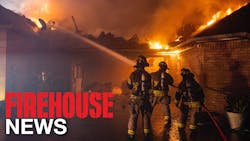$86 Million Pittsburgh Public Safety Center Causes Controversy
Pittsburgh City Council on Wednesday voted to move ahead with plans for a massive $86 million public safety training facility — but only after adding new conditions meant to alleviate concerns from residents who fear the facility will be used to militarize police.
In a preliminary vote Wednesday, Council supported a measure to spend $1.8 million on a master plan for the sprawling 168-acre site that formerly housed the Veterans Affairs Pittsburgh Health Care System in Lincoln-Lemington.
All members supported the measure except Councilwoman Theresa Kail-Smith, D-West End, who abstained, saying she wanted additional information from the law department.
A final vote is expected next week.
Residents flocked to City Council in recent weeks to push back on plans for what many have called a "cop city."
The training site would include space for police, fire, EMS and social workers employed by the city's Office of Community Health and Safety. Public Safety Director Lee Schmidt said he wants it to be a "safety city," not a "cop city."
Not all residents are convinced.
Seth Davis, of Squirrel Hill, was one of several speakers who told council they worried the site would be used to "militarize" police.
"It's going to be a cop city by another name," Davis said.
City Council on Wednesday amended the proposal to specify the parameters of the master plan. It will cover such things as a K-9 training facility, an indoor firing range and emergency vehicle storage.
The master plan will also address:
- Training classrooms for all bureaus
- Emergency vehicle operations course
- An evidence warehouse
- A fire burn tower
- An indoor pool
- Salt and winter weather equipment storage
Restrictions added to the measure would bar the plan from including facilities on the campus where federal law enforcement agencies or foreign militaries, intelligence services or law enforcement agencies would train.
They would also bar any simulated environment where officers would be trained for "urban warfare" or occupying cities.
Another provision added Wednesday would require that facilities be open to the public "to the greatest extent possible." That could include public access to pools, gyms, classrooms, the driving track and the firing range.
The new conditions tacked on to the bill prohibit the company conducting the master plan — Henningson Durham & Richardson, or HDR — from surveilling residents' online or in-person activities or manipulating public opinion.
The provision was added after Councilwoman Deb Gross, D-Highland Park, raised concerns about HDR surveilling opponents of other projects.
Wary residents
The new provisions are meant to address public backlash from wary residents.
"There are so many other things this city needs," Chelsea Perron told council members.
She was one of several Pittsburghers who urged officials to spend money instead on housing, infrastructure or public transit — though the city is not responsible for county-run transit services.
"I've heard nothing about how Pittsburgh actually needs a cop playground," Regina Hendley, of Polish Hill, said.
Some residents called for the land to be put to other uses.
But that's easier said than done.
The city purchased the property from the federal government under a contract that specified it must be used for public safety purposes. The deal also required a master plan be completed by next June.
If the city does not complete a master plan by that deadline, the federal government could take back the land. Some city officials have raised concerns the Trump administration may use it for an immigration detention facility.
"That's a real fear for my community," said Councilman Anthony Coghill, D-Beechview.
Jake Pawlak, director of the Office of Management and Budget, said Pittsburgh could try to renegotiate the terms of the deal, but he feels the city would be in a better position to do so with a master plan in hand.
Still, some residents said they didn't want to see the city move ahead with a public safety facility based on fears of what the federal government might do if they took the land back.
"We cannot make decisions about the future of our city based on fear," Miriam Perez-Putnam, of Lincoln-Lemington, said.
Reimagining public safety
Officials said there would be more public discussion ahead of any building on the site.
They also reiterated that police will occupy only a fraction of the property. Schmidt said EMS and fire training would be prioritized over police training, as the needs are greater for those bureaus.
Existing training facilities are subpar, officials said. The city leases classroom spaces for police training.
Firefighters have to travel outside of the city for portions of their training, while some people have to sit on the floor at the training site within EMS headquarters because it's too cramped.
Highland Park residents living near the outdoor firing range currently used by police have long called for the noisy facility to be moved.
Schmidt said a new site would allow all public safety personnel to train together, including social workers who do not currently have designated training spaces.
"We're trying to reimagine what public safety looks like," Schmidt said. "A new campus that allows everyone to train together, to train alongside each other, will help reimagine that."
Julia Burdelski is a TribLive reporter covering Pittsburgh City Hall and other news in and around Pittsburgh. A La Roche University graduate, she joined the Trib in 2020. She can be reached at [email protected].
© 2025 The Tribune-Review (Greensburg, Pa.). Visit www.triblive.com. Distributed by Tribune Content Agency, LLC.
